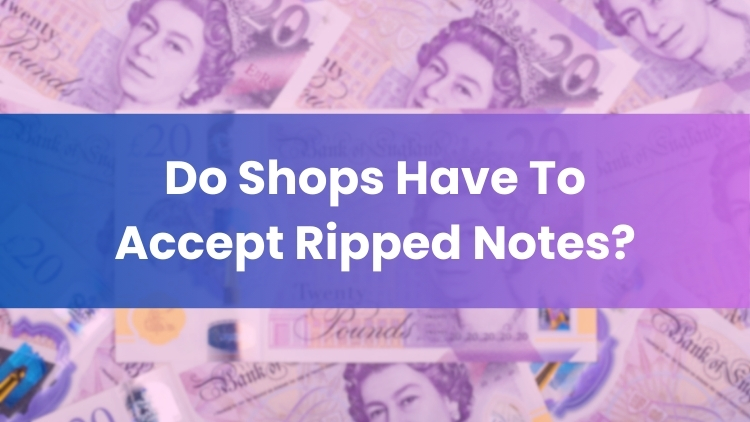
Picture this: you’ve just reached the checkout with your shopping, only to discover you've got a ripped banknote in your wallet. What happens next? Is the shop obliged to take it, or could you find yourself in a bit of a pickle?
Understanding the rules about damaged cash can be quite handy, especially if you ever encounter this situation. Let’s explore how this works in the UK.
Do Shops Accept Ripped Notes In The UK?
In the UK, whether a shop accepts a damaged note is up to the individual retailer. Shops might have their own policies, and while it might be frustrating if they refuse, they are within their rights to do so.
Retailers often prefer notes that are in good condition. This ensures smoother transactions and reduces the risk of the note being rejected by banks later. However, if a note is slightly worn, but still has its unique features intact, some shopkeepers might still accept it.
If you find yourself holding a significantly damaged note that a shop does not want to take, you can turn to the Bank of England for help. They have a straightforward process for exchanging damaged notes, either via post or by visiting in person. This may be especially useful if you need the note to be verified, or if it's extensively damaged.
Are Ripped Notes Legal Tender?
In the UK, banknotes that are considered legal tender mean they can be used to settle debts. However, it's important to know what the term "legal tender" really means and how it applies to damaged notes.
A ripped banknote might still be legal tender, depending on the extent of the damage. Legal tender status doesn't guarantee acceptance by retailers—shops can choose whether to take damaged notes under their discretion. This is because, although the note is legal tender, its condition might affect its usability.
The Bank of England has guidelines for the exchange of damaged notes, offering a way to replace a note if a significant portion can be verified. This process may be particularly useful if the note is unable to be used for transactions in its current state.
Even if a note remains legal tender, its condition impacts whether businesses are willing to accept it. Understanding this difference can help you navigate situations where your cash might not be in pristine condition. Knowing your options ensures you're prepared if you encounter a ripped note in your wallet.
Do Cash Machines Reject Ripped Notes?
Cash machines, or ATMs, are designed to read and verify banknotes when they are deposited. They use various sensors and mechanisms to ensure that the notes you insert are in good condition and fit for recirculation. Ripped or damaged notes can often trigger a rejection from these machines.
When you attempt to deposit a ripped note, the machine might return it due to its condition. This is because ATMs are equipped to identify notes that do not meet their standards for quality and usability. Even a small tear or crease can affect the note's compatibility with the machine's system.
If you find a cash machine rejecting a note, it may be worth setting it aside. Alternatively, you might consider exchanging it at a bank branch where staff can assess it for you. They usually have the resources to determine if it can be accepted, or if it needs to be replaced.
Understanding how cash machines handle damaged notes can help set expectations and direct you towards the best steps to take when dealing with less-than-perfect cash.
**The information provided in this blog is intended for educational purposes and should not be construed as betting advice or a guarantee of success. Always gamble responsibly.
